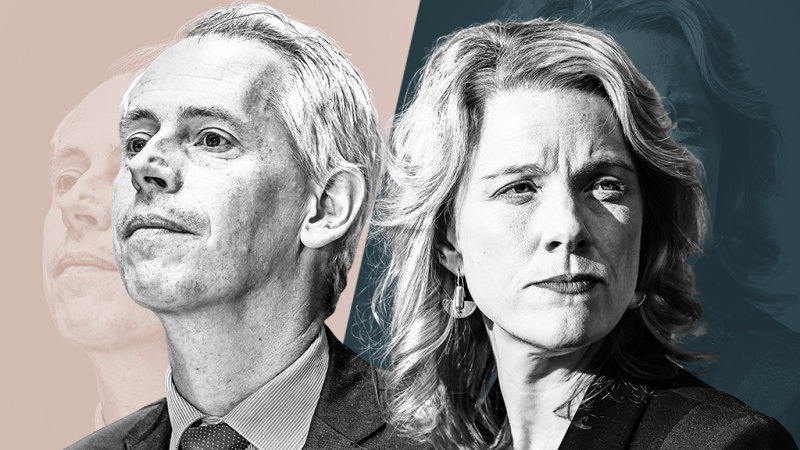By James Massola
Save articles for later
Add articles to your saved list and come back to them any time.
In 2015, Andrew Giles helped lead a last-ditch effort by the Labor Party’s Left faction to stop a profound policy shift.
Bill Shorten, the then-leader, wanted the ALP to officially shift position and support the turnback of asylum seeker boats when it was safe to do so.
The Coalition’s Operation Sovereign Borders, promised by Tony Abbott and implemented by Scott Morrison, had stopped the flow of asylum seeker boats and the then-opposition leader wanted to cauterise the wound, which dated back to the Rudd-Gillard days.
Opposition Leader Bill Shorten at the previous Labor National Converence in 2015.Credit: Andrew Meares
In Shorten’s view, there was no path back to government for Labor without taking the issue off the table – voters simply wouldn’t back the ALP if they didn’t trust them to be equally tough.
Giles, fellow rising star Murray Watt and other members of the Left had other ideas.
They moved a motion at the Labor national conference to stop Shorten’s plan, which Richard Marles had carriage of as then shadow minister for immigration.
They were backed by Anthony Albanese, who had the courage of his convictions to support them in the conference floor vote, and by other senior Left members, including Tanya Plibersek and Penny Wong, who had proxies cast their votes for them.
But it was not to be, with Giles, Watt, Albanese and the Left rolled in probably the hardest-fought internal ALP debate of the past decade.
Giles’ position was not surprising. Fourteen years earlier, he was a lawyer acting on behalf of refugees in the legal team that defended hundreds of asylum seekers rescued by Norwegian freighter MV Tampa in international waters about 140 kilometres north of Christmas Island.
An Australian Army vessel patrolling the waters near the Norwegian freighter Tampa in 2001. Credit: AP
The MV Tampa was a Norwegian container ship that had picked up a sinking Indonesian fishing boat with 438 Afghan asylum seekers on board in the Indian Ocean in August 2001.
The boat sought passage to Christmas Island, but then-prime minister John Howard refused its entry to the Australian territory, and sent in the Special Air Service regiment to ensure it didn’t happen.
Even as the incident created international headlines and brought opprobrium on Australia, Howard’s hardline stance played well at home headed into the November election – and it became a defining moment for the Labor opposition too, dividing the party and arguably swinging momentum back towards the Coalition.
Fast-forward to today and Giles holds the immigration portfolio, one of the most politically fraught for the federal ALP. Along with Watt, Defence Industry Minister Pat Conroy and Assistant Minister for Trade and Manufacturing Tim Ayres, he is also one of Albanese’s most trusted factional lieutenants.
Following the High Court’s landmark decision this month that indefinite immigration detention is illegal, which overturned a 20-year precedent established by the 2004 Al-Kateb ruling, Giles and his senior minister, Clare O’Neil have been under the microscope like never before.
For decades, immigration policy and asylum seekers has been a vexed issue for Labor, with the party often divided between a Left faction that wants a kinder, more inclusive approach to the issue and a Right faction that wants to nullify the issue politically and match the Coalition’s stance.
The court’s ruling meant that 92 people held in indefinite detention had to be freed, a figure that could rise to 340 people, once the reasons for the ruling are eventually published, which may not be until February.
The decision on November 8 has revived memories in Labor of the court’s 2011 ruling against Julia Gillard’s Malaysian solution, in which Australia would have accepted 4000 people certified as refugees from Malaysia in return for the Asian country taking 800 asylum seekers who had arrived on Australian shores.
This border crisis has erupted as the Albanese government is under pressure over the cost of living, much as the Howard government had been in August 2001, months after the introduction of the GST.
Into this political maelstrom step O’Neil – the minister for Home Affairs – and Giles.
The irony of a Labor Left faction powerbroker who acted for the MV Tampa asylum seekers and fought boat turnbacks being charged with helping implement a law-and-order response to the court’s decision has not been lost on Giles’ colleagues.
The contrast between Giles and O’Neil is stark, too: while both are Victorians and went to prestigious private schools in Melbourne (Scotch College and Loreto Mandeville), that’s where the similarities end.
Immigration Minister Andrew Giles (centre) and Home Affairs Minister Clare O’Neil (right) in parliament pushing through the migration amendment in the wake of the High Court decision, as Leader of the House Tony Burke listens in. Credit: Alex Ellinghausen
O’Neil, 43, is seven years younger than Giles and seen as a rising star of the Right faction.
She’s been on a path to high office since becoming mayor of Greater Dandenong aged just 23. She has law and arts degrees from Monash, a master’s degree in public policy from Harvard, was a Dean’s scholar and Fulbright scholar, worked briefly for former treasurer Wayne Swan and then spent time as a management consultant at McKinsey & Co, entering federal parliament in 2013 at the age of 32.
O’Neil came late to preselection for the seat of Hotham, which had once been held by Labor leader Simon Crean, after candidate Geoff Lake had been sent packing by Kevin Rudd, and she arrived with the backing of Bill Shorten, who was soon to become party leader.
Though she’s still in Shorten’s political orbit, factionally she’s isolated: the Right-aligned union that backed her into parliament, the National Union of Workers, merged a few years ago with the larger, more powerful and Left-aligned United Voice union to create the United Workers Union.
She also did herself no favours by briefly standing against Richard Marles (who is from the larger, Stephen Conroy-aligned Victorian Right sub-faction) in 2019 for the deputy position, a move that set her back.
Though she’s not in any danger of losing her seat in an internal tussle, the merger makes it more difficult for O’Neil to create a power base.
Clare O’Neil was catapulted into the demanding Home Affairs role after Kristina Kenneally was defeated in the 2022 election. Credit: Alex Ellinghausen
O’Neil was shadow minister for ageing, which is not a cabinet post, before the 2022 election. She was catapulted into cabinet, and one of the most difficult portfolios, after former Labor senator Kristina Keneally failed in her bid to move to the lower house seat of Fowler.
A Victorian Labor colleague, speaking on background to discuss internal matters, noted that few in the caucus would have put their hand up for the portfolio. Chris Bowen and Tony Burke were both immigration ministers when it was a senior portfolio in the Rudd-Gillard years, and knew first-hand that the job has been a poisoned chalice.
“It’s a job that no one else wanted to do. No one sets out to be minister for Home Affairs. It’s a similar test for O’Neil to the one Rudd gave Bill Shorten with disabilities and bushfire reconstruction – if you do well, great, and if you fail, also great,” they said.
Early in the life of the Albanese government, O’Neil angered colleagues when she placed a story that landed on the front pages of the News Corp tabloids – with the headline Jihadi High – that warned schools were a new recruitment zone for Islamic State and that kids were being radicalised and shown beheading videos.
Both Giles and O’Neil declined to comment for this article. But according to one observer in the ministerial wing, the pair and their offices have worked closely together since the court’s reversal on indefinite detention.
“I haven’t seen anything that indicates any kind of difference between them. They have been very positive. At the beginning, there was some wariness because they’re from different factions. But then they both realised Home Affairs can be a shit sandwich, so they’re working closely together,” the person said.
There is some chatter about Giles and O’Neil singing from different song sheets at times since the November 8 court ruling, as they deal with the full implications – which has so far seen 93 people released into the community, including at least three murderers and some sex offenders.
Last Sunday, O’Neil said that “these people are not people who I wanted on the streets of our country, and that is exactly why they were kept in detention until our government received a High Court ruling that we must follow, that meant we must release these people from immigration detention”.
Giles has adopted the role of chief explainer – earnestly updating the public on how many people had been released into the community because of the decision, promising the government had prepared for a possible defeat and that it was acting to keep the community safe.
An ally of Giles in caucus, who asked not to be named, said there was some tension between the pair, noting dryly “they have two very different styles as politicians”.
A second MP, who also asked not to be named, said: “Clare is a very good line deliverer – she does the punch-through message bit. Andrew is more concerned with setting out the position, doing the explanation piece.
“But this was a shared tactical fail. They should have put more information out early. We had done work ahead of time, but we did not expect a decision on the spot from the court and without providing their reasons.”
Another observer in the ministerial wing said “they’re both new ministers, they’re green. Some of it is the Left-Right divide, too”.
“But how they didn’t have legislation ready just in case, I don’t know. Doesn’t anyone remember the Malaysian solution or the citizenship crisis? The High Court has a habit of doing this to governments,” they said.
“Clare has delivered the message a lot better than Giles. Even when Giles said the right thing, you could see he was being tough through gritted teeth.”
Giles has argued forcefully that while they had been preparing for a potential defeat in the courts, having draft legislation ready beforehand was not possible without knowing the decision.
A veteran Labor member described the government’s response as “the worst week we have had as a government, worse than the Voice defeat”.
As the High Court is not expected to deliver the reasons for its judgment until February, Giles and O’Neil’s shared legal headache is far from over.
The Tampa lawyer and the McKinsey consultant have months, if not years, of delicate negotiation through a political minefield to negotiate.
For the sake of the Albanese government, they will need to ensure they’re singing from the same song sheet.
Cut through the noise of federal politics with news, views and expert analysis from Jacqueline Maley. Subscribers can sign up to our weekly Inside Politics newsletter here.
Most Viewed in Politics
Source: Read Full Article






